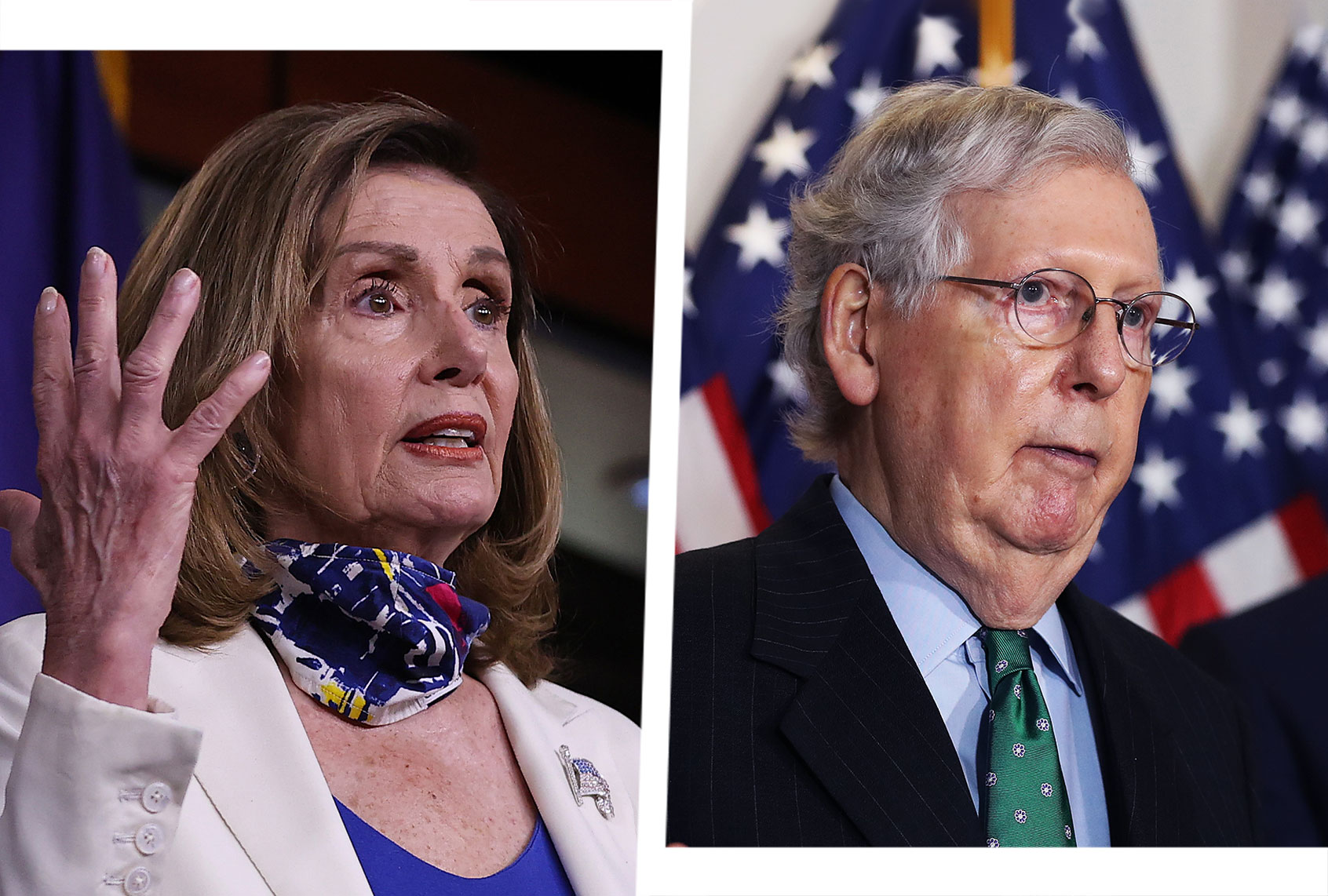With less than three weeks until Election Day, Donald Trump faces the increasing likelihood that millions of struggling Americans will languish in needless poverty after Senate Majority Leader Mitch McConnell announced Thursday that he does not plan to bring either the president’s or House Democrats’ stimulus proposals to the Senate floor.
The underlying issue is the proposed size of the stimulus legislation. McConnell, a Republican, is pushing for a $500 billion proposal, claiming that pricier alternatives are too expensive. House Speaker Nancy Pelosi, a Democrat, is pushing for a bill that would spend $2.2 trillion in relief, while Trump’s Treasury Secretary Steven Mnuchin has been dispatched to suggest stimulus relief in excess of $1.8 trillion.
The dynamics behind these stimulus negotiations are unusual in at least one key respect: Trump, a Republican, is veering from his party’s traditional support for fiscal austerity and moving closer toward the Democratic proposals for more robust relief measures. The Democratic proposal would include $600 in weekly enhanced unemployment benefits, checks of $1,200 to qualifying adults (or $2,400 for couples) and $500 for their dependents, child care and education assistance, housing assistance, an extension of the Pandemic Unemployment Assistance program, an increase in SNAP benefits and increased funding for the Paycheck Protection Program.
Republicans, by contrast, want to strip relief to all but the barest bones, prompting Democrats to block a $300 billion plan that the GOP proposed last month. While McConnell has subsequently slightly increased the measure to $500 billion, Trump has made it clear that he wants more from Senate Republicans, tweeting earlier this week that they need to “go big or go home!” His underlying political rationale for wanting Republicans to break from their conservative orthodoxy and back more generous legislation was perhaps best summed up in a letter Pelosi sent to her Democratic colleagues on Tuesday.
“A fly on the wall or wherever else it might land in the Oval Office tells me that the President only wants his name on a check to go out before Election Day and for the market to go up,” Pelosi claimed.
This is not to say that McConnell and the Republicans are ideologically motivated. As Bloomberg reported earlier this week, many Senate Republicans believe Trump is going to lose to his Democratic opponent, former Vice President Joe Biden, and want to make sure he will be unable to benefit from a healthy economy:
A GOP strategist who has been consulting with Senate campaigns said Republicans have been carefully laying the groundwork to restrain a Biden administration on federal spending and the budget deficit by talking up concerns about the price tag for another round of virus relief. The thinking, the strategist said, is that it would be very hard politically to agree on spending trillions more now and then in January suddenly embrace fiscal restraint.
Trump himself is not opposed to accusing Democrats of excessive spending, telling Fox Business’ Stuart Varney that Pelosi is “asking for all sorts of goodies. She wants to bail out badly run Democrat states and cities. She wants money for things that you would never, you just couldn’t — just — your pride couldn’t let it happen.” At the same time, it is conventional wisdom at this point that any hope Trump might have of winning the upcoming elections rests on at the very least being able to claim that the American economy is strong.
Instead, now that the stimulus passed earlier this year has worn off, the economy is getting progressively worse. A pair of studies have found that anywhere from 6 million to 8 million Americans have fallen into poverty since May, after the sole federal stimulus check sent to American families had been disbursed. Roughly 898,000 Americans filed initial jobless claims last week, an increase of 53,000 from the previous week and higher than economists had expected. Research indicates that, to the extent that there has been any kind of economic recovery, it has been “K-shaped,” meaning that the wealthy have gotten even richer while ordinary Americans are worse off than before.
“Both sides are gaming the election by calculations about what mix of specifics would, if passed, boost their vote,” Dr. Richard D. Wolff, professor emeritus of economics at the University of Massachusetts–Amherst, told Salon by email. “They may still reach some deal (less likely with each passing day) if they can find a mix that each thinks will advantage it in the election. The delay for months now (and especially since July 31 when the extra $600 for the unemployed was cut to $300-400) has kept the stimulus far below what is needed to offset the current depression.”
He added, “Absent from it most notably is a provision for public jobs for the 26 million now collecting state and federal unemployment benefits: (1) public jobs is what the unemployed want and need, (2) it would cost only a bit more than is now paid out in unemployment benefits, and (3) it would give back to society the product of those public employees. That was done successfully during the 1930s; it is a shameful display than today’s stimulus talks omit public jobs altogether.”

